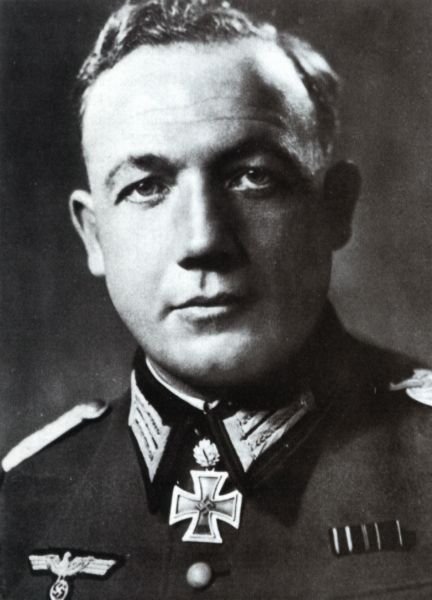Bremm, Josef
- Date of birth:
- May 3rd, 1914 (Mannebach-Adenau/Palatinate, Germany)
- Date of death:
- October 21st, 1998 (Monreal/Rhineland-Palatinate, Germany)
- Nationality:
- German
Biography
Career:
August 26th, 1939: Zugfhr. 11./Inf.Rgt. 453;
November 1st, 1939: Adj. III./Inf.Rgt. 453;
November 1st, 1940: Zugfhr. Gren.Ers.Btl. 5;
March 2nd, 1941: Adj. II./Inf.Rgt. 426;
August 2nd, 1941: Chef 5./Inf.Rgt. 426;
December 2nd, 1942: Kdr. II./Gren.Rgt. 426;
March 16th, 1943: Waffenlehrer Inf.Schüle Döberitz;
May 2nd, 1943: x?;
March 15th, 1944: Kdr. Füs.Btl. 712;
August 1st, 1944: Kdr. Gren.Rgt. 990.
Do you have more information about this person? Inform us!
- Period:
- Second World War (1939-1945)
- Awarded on:
- June 27th, 1940
According to other source was awarded on 6-6-1940
- Period:
- Second World War (1939-1945)
- Awarded on:
- December 15th, 1940
According to other source was awarded on 18-12-1940.
- Period:
- Second World War (1939-1945)
- Rank:
- Leutnant der Reserve (2nd Lieutenant of Reserves)
- Unit:
- Chef 5. / Infanterie-Regiment 426 / 126.Infanterie-Division / XXXVIII.Armee-Korps / 16.Armee / Heeresgruppe Nord
- Awarded on:
- February 18th, 1942
“On the morning of the 22.12.1941 Leutnant Bremm and his depleted 5. Kompanie repelled a strong Russian attack against the Orelje barracks bridgehead following a tough battle. After he had brought the attack to a halt he launched a counterthrust on his own initiative, leading at the head of his troops and breaking into the enemy force. Using his machine-pistol and hand grenades, he killed a desperately defending commissar who was the soul of the enemy resistance. This counterthrust by a weak Kompanie partially destroyed an enemy Bataillon, and the remainder were totally shattered.”
874th Award.
- Period:
- Second World War (1939-1945)
- Rank:
- Oberleutnant der Reserve (1st Lieutenant of Reserves)
- Unit:
- Chef 5. / Infanterie-Regiment 426 / 126.Infanterie-Division / II.Armee-Korps / 16.Armee / Heeresgruppe Nord
- Awarded on:
- December 23rd, 1942
The following press notice describes why Bremm was awarded the Oakleaves…
“Oberleutnant Josef Bremm already received the Knight’s Cross on the 18.02.1942 as a Leutnant. With this award he was rightfully recognized for his outstanding bravery during the hard defensive combat in the winter of 1941/42. He would go on to repeatedly distinguish himself as a particularly brave and energetic officer during the heavy combat southeast of Lake Ilmen. At the end of September, while leading at the head of an assault troop, he penetrated into an enemy blocking position with the full element of surprise and rolled it up in a bold follow-up action. It was solely thanks to this action that his attacking Regiment was able to reach its ordered day’s objective. A few days later he and his subordinated Bataillon shielded the Division’s flank all by themselves against the oncoming Bolsheviks. In the process he was wounded for the fourth time, however he did not give up his command until all the enemy attacks had been broken.”
165th Award.
“Oberleutnant Josef Bremm already received the Knight’s Cross on the 18.02.1942 as a Leutnant. With this award he was rightfully recognized for his outstanding bravery during the hard defensive combat in the winter of 1941/42. He would go on to repeatedly distinguish himself as a particularly brave and energetic officer during the heavy combat southeast of Lake Ilmen. At the end of September, while leading at the head of an assault troop, he penetrated into an enemy blocking position with the full element of surprise and rolled it up in a bold follow-up action. It was solely thanks to this action that his attacking Regiment was able to reach its ordered day’s objective. A few days later he and his subordinated Bataillon shielded the Division’s flank all by themselves against the oncoming Bolsheviks. In the process he was wounded for the fourth time, however he did not give up his command until all the enemy attacks had been broken.”
165th Award.
- Period:
- Second World War (1939-1945)
- Awarded on:
- July 17th, 1941
- Period:
- Second World War (1939-1945)
- Awarded on:
- November 13th, 1941
- Period:
- Second World War (1939-1945)
- Awarded on:
- June 1st, 1942
- Period:
- Second World War (1939-1945)
- Awarded on:
- July 25th, 1942
- Period:
- Second World War (1939-1945)
- Awarded on:
- January 12th, 1943
- Period:
- Second World War (1939-1945)
- Awarded on:
- June 1st, 1943
Sources
- Photo 1: Wehrkundearchiv
- Photo: Deutsches Wehrkundearchiv
- - FELLGIEBEL, W.P., Elite of theThird Reich, Helion & Company Limited, Solihull, 2003.
- THOMAS, FRANZ & WEGMANN, GüNTER, Die Ritterkreuzträger der Deutschen Wehrmacht 1939-1945, Biblio Verlag, Osnabrück, 1993.
- Kwasny A., Kwasny G., Die Eichenlaubträger 1940-1945 (CD), Deutsches Wehrkundearchiv, Lage-Waddenhausen, 2001
- Die Ritterkreuztraeger der Deutschen Wehrmacht und Waffen-SS












